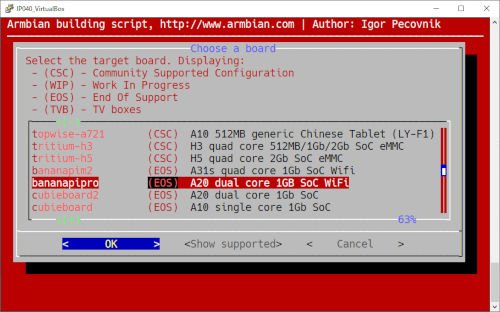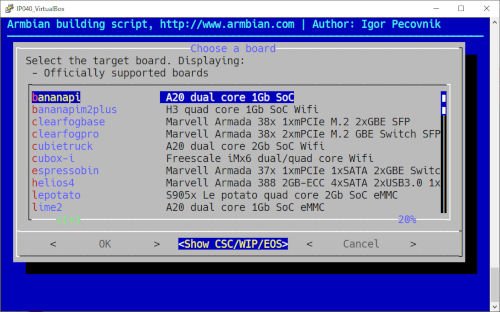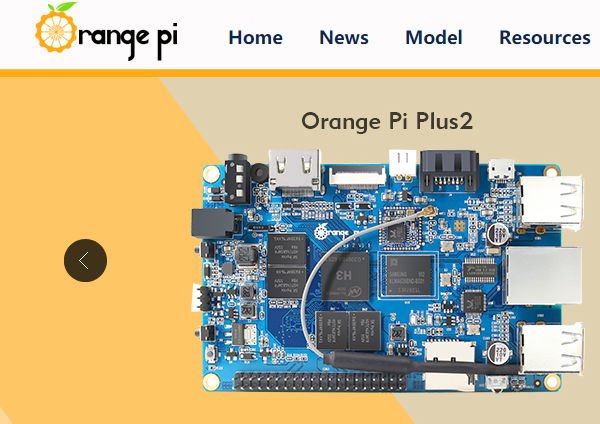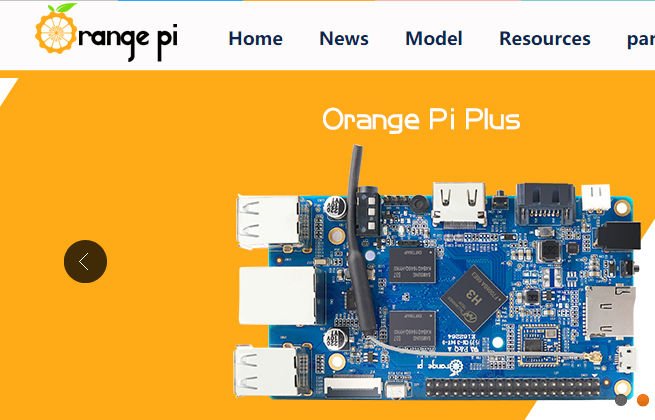-
Posts
1798 -
Joined
-
Last visited
Content Type
Forums
Store
Crowdfunding
Applications
Events
Raffles
Community Map
Posts posted by guidol
-
-
3 hours ago, bigheart said:
card 2: Audio [iFi (by AMR) HD USB Audio], device 0: USB Audio [USB Audio]
Subdevices: 1/1
Subdevice #0: subdevice #0
i found there is no asound.conf in /etc ...
how can i set the default alsa device to card 2 ?
put and save the follwing in /etc/asound.conf and reboot:
pcm.!default { type hw card 2 device 1 } ctl.!default { type hw card 2 }after reboot check the volume-level with alsamixer...
-
14 minutes ago, Igor said:
If one Banana must go, "complex" one goes first. IIRC there are issues with wifi in 4.19.y ... the rest is simple and must work. We can easily add a normal BPi there as well

Why not tell users that it will be a "combinded" image for the normal/PRO BPi, but because of the WiFi-Problem in 4.19.y there is support for the onboard WiFi of the Pro. They could use a USB-WiFi or ethernet?
-
On 10/17/2018 at 7:32 PM, zador.blood.stained said:
No need to be surprised, absolutely any device can be dropped based on objective reasons, mainly lack of an interested developer or persisting HW or SW issues that we can't solve.
short question - why only the BPi Pro and not the normal BPi? The Pro version only has additionally WiFi from my sight. CPU / Ram is the same.
What did I miss? -
-
For me - I cant see any useful possibilities for a armbian-system <256MB

With 256Mb my smallest system is a Orange Pi R1.On a OrangePi Zero with 512MB the memory looks like this with node.js, Node-Red and PM2:
top - 20:24:16 up 1 day, 10:49, 1 user, load average: 0.00, 0.00, 0.00 Tasks: 99 total, 1 running, 55 sleeping, 0 stopped, 0 zombie %Cpu(s): 0.4 us, 0.5 sy, 0.0 ni, 99.1 id, 0.0 wa, 0.0 hi, 0.0 si, 0.0 st KiB Mem : 505156 total, 163500 free, 156164 used, 185492 buff/cache KiB Swap: 252576 total, 252576 free, 0 used. 331636 avail Mem PID USER PR NI VIRT RES SHR S %CPU %MEM TIME+ COMMAND 25008 root 20 0 8664 2820 2364 R 2.9 0.6 0:03.39 top 1285 root 20 0 121740 40844 19220 S 0.3 8.1 5:28.15 PM2 v3.2.4: God 1303 root 20 0 160508 82408 20548 S 0.3 16.3 7:46.98 node-red 17323 root 20 0 0 0 0 I 0.3 0.0 0:29.46 kworker/0:1-eve 24991 root 20 0 0 0 0 I 0.3 0.0 0:00.18 kworker/1:1-eve 1 root 20 0 26936 5456 3832 S 0.0 1.1 1:09.13 systemd 2 root 20 0 0 0 0 S 0.0 0.0 0:00.16 kthreadd 3 root 0 -20 0 0 0 I 0.0 0.0 0:00.00 rcu_gp 4 root 0 -20 0 0 0 I 0.0 0.0 0:00.00 rcu_par_gp 8 root 0 -20 0 0 0 I 0.0 0.0 0:00.00 mm_percpu_wq 9 root 20 0 0 0 0 S 0.0 0.0 0:00.58 ksoftirqd/0 10 root 20 0 0 0 0 I 0.0 0.0 0:27.12 rcu_sched 11 root 20 0 0 0 0 I 0.0 0.0 0:00.00 rcu_bh 12 root rt 0 0 0 0 S 0.0 0.0 0:00.25 migration/0 13 root 20 0 0 0 0 S 0.0 0.0 0:00.00 cpuhp/0 14 root 20 0 0 0 0 S 0.0 0.0 0:00.00 cpuhp/1 15 root rt 0 0 0 0 S 0.0 0.0 0:00.07 migration/1 16 root 20 0 0 0 0 S 0.0 0.0 0:02.13 ksoftirqd/1 19 root 20 0 0 0 0 S 0.0 0.0 0:00.00 cpuhp/2 20 root rt 0 0 0 0 S 0.0 0.0 0:00.24 migration/2 21 root 20 0 0 0 0 S 0.0 0.0 0:00.23 ksoftirqd/2 24 root 20 0 0 0 0 S 0.0 0.0 0:00.00 cpuhp/3 25 root rt 0 0 0 0 S 0.0 0.0 0:00.24 migration/3 26 root 20 0 0 0 0 S 0.0 0.0 0:00.19 ksoftirqd/3 29 root 20 0 0 0 0 S 0.0 0.0 0:00.03 kdevtmpfs 30 root 0 -20 0 0 0 I 0.0 0.0 0:00.00 netns 35 root 20 0 0 0 0 S 0.0 0.0 0:00.00 kauditd 36 root 20 0 0 0 0 S 0.0 0.0 0:00.00 oom_reaper -
30 minutes ago, Tido said:
EOS, something I still don't understand. Now (at Kernel 4.20) that Mainline Kernel supports almost every function of that SoC, making this electronic waste.
My Banana Pi (non-Pro) is playing his role a Pi-Hole fine here

Welcome to ARMBIAN 5.67 user-built Debian GNU/Linux 9 (stretch) 4.19.4-sunxi System load: 0.11 0.15 0.10 Up time: 13:33 hours Memory usage: 9 % of 998MB IP: 192.168.6.3 CPU temp: 31°C root@bpi-pihole(192.168.6.3):~#
-
42 minutes ago, sgei said:
Yesterday I wanted to build a new image for our BananaPro projects, but unfortunately there is no support for Banana Pi Pro anymore. Why?
Is it possible to continue supporting this board?
If you user the armbian-build-system with
./compile.sh EXPERT="yes"
you can build (at this time- but for how long) a new image for the Banana Pi Pro
Select EOS and then the "Banana Pi Pro"
But from my view the "Pro" has only WiFi-onboard and the Cinch-CVBS/FBAS Connector anymore (maybe CVBS included in 3.5mm port)
CPU A20 DualCore and 1Gb DDDR3 Ram ist the same.
http://www.banana-pi.org/m1.html = nonPro
-
...but ifI hadnt a card in the MicroSD-slot of my OPi One it didnt show any information - also no u-boot sign of life
-
1 hour ago, Peter Hudak said:
I can't boot my new OrangePi One v.1.1.
I have tried with all downloadable images from Armbian as well as an ancient image from orangepi.org. Flashed with Etcher and dd.
Power supply is 5V 3A. Ethernet is unplugged and nothing is connected to USB.
To me it seems the board has something new on it that is not recognised by driver or there is a hardware issue with the OrangePi One. One of the cards was working fine in RaspberryPi.
I got 5 OPi One v1.1 since a year and all of them do boot armbian from a 16GB Sandisk Ultra (up to 80MB/sec read - Class 10).
They als do boot my selfbuild (via the armbian-build-system) acutal dev version:
Armbian_5.67_Orangepizero_Debian_stretch_dev_4.19.11.imgSome SBC does have hardware-problems with the hardware-detection of the sdcard (connection inside the MicroSD-Slot fails) - and your u-boot log does show that the board didnt found MMC0 and MMC1
One of mine OPi One does show these lines - before starttig the kernel. see the lines in the hidden section below:
SpoilerU-Boot SPL 2017.11-armbian (Apr 20 2018 - 12:19:20)
DRAM: 512 MiB
Trying to boot from MMC1
U-Boot 2017.11-armbian (Apr 20 2018 - 12:19:20 +0300) Allwinner TechnologyCPU: Allwinner H3 (SUN8I 1680)
Model: Xunlong Orange Pi One
DRAM: 512 MiB
MMC: SUNXI SD/MMC: 0
*** Warning - bad CRC, using default environmentIn: serial
Out: serial
Err: serial
Net: phy interface0
eth0: ethernet@1c30000
starting USB...
USB0: USB EHCI 1.00
USB1: USB OHCI 1.0
scanning bus 0 for devices... 1 USB Device(s) found
scanning usb for storage devices... 0 Storage Device(s) found
Autoboot in 1 seconds, press <Space> to stop
switch to partitions #0, OK
mmc0 is current device
Scanning mmc 0:1...
Found U-Boot script /boot/boot.scr
3708 bytes read in 243 ms (14.6 KiB/s)
## Executing script at 43100000
U-boot loaded from SD
Boot script loaded from mmc
201 bytes read in 198 ms (1000 Bytes/s)
5097109 bytes read in 595 ms (8.2 MiB/s)
6972808 bytes read in 772 ms (8.6 MiB/s)
Found mainline kernel configuration
32002 bytes read in 1792 ms (16.6 KiB/s)
4179 bytes read in 1263 ms (2.9 KiB/s)
Applying kernel provided DT fixup script (sun8i-h3-fixup.scr)
## Executing script at 44000000
## Loading init Ramdisk from Legacy Image at 43300000 ...
Image Name: uInitrd
Image Type: ARM Linux RAMDisk Image (gzip compressed)
Data Size: 5097045 Bytes = 4.9 MiB
Load Address: 00000000
Entry Point: 00000000
Verifying Checksum ... OK
## Flattened Device Tree blob at 43000000
Booting using the fdt blob at 0x43000000
Loading Ramdisk to 49b23000, end 49fff655 ... OK
reserving fdt memory region: addr=43000000 size=6e000
Loading Device Tree to 49ab2000, end 49b22fff ... OKStarting kernel ...
You did download the images from here? (and unzipped they before flashing?)
https://dl.armbian.com/orangepione/archive/
https://dl.armbian.com/orangepione/archive/Armbian_5.65_Orangepione_Debian_stretch_next_4.14.78.7z
Did you enable the verify in the etcher options? -
5 minutes ago, andy_n said:
It is working absolutely perfect.
In most programming forums you get arrogantly stupid answers (guys who just want to satisfy quote, who has more answers today).
Here you get the right help. Thank you.
No problem
 maybe you can help in the future anyone who needs a right answer here in the forum...
maybe you can help in the future anyone who needs a right answer here in the forum...
Mostly you need only the right search-keywords for the aunt Google and in the future I have the solution for me also!
and in the future I have the solution for me also!
-
MIN_SPEED should be 480000 and not 408000

-
also not low power devices like USB-Stic, mouse or keyboard.
Try
dmesg -w
and then connect the usb-device... maybe there is a messsge?
Did you check if usb is complete enabled in
armbian-config --> system --> hardware?
-
28 minutes ago, Tido said:
So, it is the end of December 2018. I do not follow their github/gitlab, however I haven't heard about any updates on the stretch goal (h265) for a while. Has anybody else some news ?
Allwinner "Cedrus" Driver Moving Ahead With H.264 & H.265 Video Decode Support and
https://bootlin.com/blog/allwinner-vpu-support-in-mainline-linux-november-status-update/
-
On 12/17/2018 at 11:27 AM, sumit6975 said:
I used a stable Armbian Image (Armbian Stretch mainline kernel 4.18.y) for OdroidC2. The OS booted up normally but the USB hubs didn't detect the connected peripherals. The output of `lsusb` didn't show any of the connected peripherals.
by USB-Hub do you mean the 4 "internal" ports of the C2 or did you connect an external USB-Hub to one of the 4 USB-Ports of the C2?
Your log does show the 4 ports
880 [ 2.111292] usb 1-1: new high-speed USB device number 2 using dwc2 882 [ 2.290624] usb 1-1: New USB device found, idVendor=05e3, idProduct=0610, bcdDevice=32.98 883 [ 2.290634] usb 1-1: New USB device strings: Mfr=0, Product=1, SerialNumber=0 884 [ 2.290638] usb 1-1: Product: USB2.0 Hub 885 [ 2.291319] hub 1-1:1.0: USB hub found 886 [ 2.291617] hub 1-1:1.0: 4 ports detected
what kind of USB-Modem do you want to use?
Does it have a port for a power-supply?
Why you cant use WiFi or Ethernet? -
11 hours ago, andy_n said:
There is no another (elegant) solution?
When booting, Linux should send short UDP broadcast datagram. It's all.
more elegant would be to know the right moment - when to start- your service and on what it depends.
if your service depends (because of the UDP packet = a full working network) then the following page could have an solution for you:
Systemd: how to make a systemd service start after network fully connected?
Also have a look at
How to list all services that start AFTER certain service in systemd
-
7 hours ago, ridho13 said:
could you tell me how to do that? i have looking how to do it but no success. thank you
edit the file /etc/default/cpufrequtils
the save and reboot:
# WARNING: this file will be replaced on board support package (linux-root-...) upgrade ENABLE=true MIN_SPEED=240000 MAX_SPEED=816000 # GOVERNOR=ondemand GOVERNOR=conservative
I got my OPi Zero in the original black cube case and the Zero is arounf 54-55 degree:
12:52:57: 240MHz 0.03 1% 1% 0% 0% 0% 0% 54.7°C 0/6 12:53:02: 240MHz 0.10 2% 1% 0% 0% 0% 0% 54.6°C 0/6 12:53:08: 240MHz 0.09 1% 1% 0% 0% 0% 0% 54.1°C 0/6 12:53:13: 240MHz 0.09 1% 0% 0% 0% 0% 0% 54.5°C 0/6 12:53:18: 240MHz 0.08 1% 1% 0% 0% 0% 0% 54.7°C 0/6 12:53:24: 240MHz 0.07 1% 1% 0% 0% 0% 0% 55.4°C 0/6 12:53:29: 240MHz 0.07 1% 0% 0% 0% 0% 0% 54.5°C 0/6
-
the next chance would be an crontab-entry for reboot - maybe thats the right moment to start your service?
# Edit this file to introduce tasks to be run by cron. # m h dom mon dow command @reboot systemctl start Announce.service
if it doenst start - try to put your command line in a shell-script (.sh)
-
on a real PC with debian stretch I got the problem of the missing rc.local
With instrustions I did rebuild this as a service, but the service was starting too fast - so I had to put a
sleep 20
as the first command in beginning of the rc.local
Maybe your service will also start with pause of 20 seconds?
Could be a chance because you did wrote it will start successfully when started from commandline.
#!/bin/sh -e # # rc.local # # This script is executed at the end of each multiuser runlevel. # Make sure that the script will "exit 0" on success or any other # value on error. # # In order to enable or disable this script just change the execution # bits. # # By default this script does nothing. sleep 20 systemctl start Announce.service exit 0
-
I see different pictures for OPi Pi Plus and OPi Pi Plus 2 at www.orangepi.org
but they didnt have a board-link for the "old" Pi Plus

There is only a image at the old location:
http://www.orangepi.org/orangepiplus/H3shuoming.jpg -
@alfaktulu I checked my other OPi Zero and found that there Iam using a mbrola-voice with espeak which sounds better

Because Iam a german guy I do use the mbrola-de6 (German male voice for Mbrola) voice via the command:
espeak -vgerman-mbrola-6 -f /home/guido/speak.txt -w /tmp/espeak.wav -s110; aplay -D plughw:0,0 /tmp/espeak.wav 2>/dev/null; rm /home/guido/speak.txt german-mbrola-6 is installed via apt as package mbrola-de6
For using mbrola-voices you have to install mbrola and the voice you want to use.
You cant find these voice packages with
apt-cache search 'mbrola-'
this will give you a "long" list:
Spoilerfestvox-en1 - mbrola-en1 voice support for festival
festvox-us1 - mbrola-us1 voice support for festival
festvox-us2 - mbrola-us2 voice support for festival
festvox-us3 - mbrola-us3 voice support for festival
mbrola-af1 - Afrikaans male voice for Mbrola
mbrola-br1 - Brazilian Portuguese male voice for Mbrola
mbrola-br2 - Brazilian Portuguese female voice for Mbrola
mbrola-br3 - Brazilian Portuguese male voice for Mbrola
mbrola-br4 - Brazilian Portuguese female voice for Mbrola
mbrola-cr1 - Croatian male voice for Mbrola
mbrola-cz2 - Czech male voice for Mbrola
mbrola-de1 - German female voice for Mbrola
mbrola-de2 - German male voice for Mbrola
mbrola-de3 - German female voice for Mbrola
mbrola-de4 - German male voice for Mbrola
mbrola-de5 - German female voice for Mbrola
mbrola-de6 - German male voice for Mbrola
mbrola-de7 - German female voice for Mbrola
mbrola-ee1 - Estonian male voice for Mbrola
mbrola-en1 - British English male voice for Mbrola
mbrola-es1 - Spanish male voice for Mbrola
mbrola-es2 - Spanish male voice for Mbrola
mbrola-fr1 - French male voice for Mbrola
mbrola-fr4 - French female voice for Mbrola
mbrola-gr1 - Greek male voice for Mbrola
mbrola-gr2 - Greek male voice for Mbrola
mbrola-hu1 - Hungarian male voice for Mbrola
mbrola-ic1 - Icelandic male voice for Mbrola
mbrola-id1 - Indonesian male voice for Mbrola
mbrola-ir1 - Farsi male voice for Mbrola
mbrola-it3 - Italian male voice for Mbrola
mbrola-it4 - Italian female voice for Mbrola
mbrola-la1 - Latin male voice for Mbrola
mbrola-lt1 - Lithuanian male voice for Mbrola
mbrola-lt2 - Lithuanian male voice for Mbrola
mbrola-mx1 - Mexican Spanish male voice for Mbrola
mbrola-mx2 - Mexican Spanish male voice for Mbrola
mbrola-nl2 - Dutch male voice for Mbrola
mbrola-pl1 - Polish female voice for Mbrola
mbrola-pt1 - European Portuguese female voice for Mbrola
mbrola-ro1 - Romanian male voice for Mbrola
mbrola-sw1 - Swedish male voice for Mbrola
mbrola-sw2 - Swedish female voice for Mbrola
mbrola-tr1 - Turkish male voice for Mbrola
mbrola-tr2 - Turkish female voice for Mbrola
mbrola-us1 - American English female voice for Mbrola
mbrola-us2 - American English male voice for Mbrola
mbrola-us3 - American English male voice for Mbrola
mbrola-vz1 - Venezuelan Spanish male voice for Mbrola
If you will install a voice then automatically mbrola itself will installed as dependency

like
apt install mbrola-de6 Reading package lists... Done Building dependency tree Reading state information... Done The following additional packages will be installed: mbrola Suggested packages: cicero The following NEW packages will be installed: mbrola mbrola-de6 0 upgraded, 2 newly installed, 0 to remove and 0 not upgraded.
So ATTENTION:
mbrola-de6 is useable with epseak as german-mbrola-6 -
@Igor could you please check this?
both links for the pages
https://www.armbian.com/orange-pi-plus-2/ and
https://www.armbian.com/orange-pi-plus/ [EOS]
are going to
https://dl.armbian.com/orangepiplus/
but there is no https://dl.armbian.com/orangepiplus2/
then there is only a
https://dl.armbian.com/orangepiplus2e/
All are with H3-CPU
for Reference:
http://www.orangepi.org/orangepiplus/H3shuoming.jpghttp://www.orangepi.org/orangepiplus2/
http://www.orangepi.org/orangepiplus2e/
@john0815 did you try the stretch version for the 2E?
https://dl.armbian.com/orangepiplus2e/archive/Armbian_5.65_Orangepiplus2e_Debian_stretch_next_4.14.78.7z -
For which "Orange Pi Plus"?
I see armbian available for:
- Orange Pi One Plus (H6) - https://www.armbian.com/orange-pi-one-plus/
- Orange PI PC Plus - https://www.armbian.com/orange-pi-pc-plus/
- Orange Pi Win Plus (A64) - https://www.armbian.com/orange-pi-win/
- Orange Pi Zero Plus (H5) - https://www.armbian.com/orange-pi-zero-plus/
- Orange Pi Zero Plus 2 (H5) - https://www.armbian.com/orange-pi-zero-2-h5/
- Orange Pi Plus 2 (H3) - https://www.armbian.com/orange-pi-plus-2/
- Orange Pi Plus 2E (H3) - https://www.armbian.com/orange-pi-plus-2e/
-
3 hours ago, usuario74 said:
And if I want to poweroff. Would it be the same but just using poweroff command?
I am using Armbian Stretch on OrangePI PC2.
I will program the OrangePi to poweroff before the smartplug to which is plugged in switch the power off too.
Then I expect to reboot remotely by turning the smartplug on.
Yes - this will work

# .---------------- minute (0 - 59) # | .------------- hour (0 - 23) # | | .---------- day of month (1 - 31) # | | | .------- month (1 - 12) OR jan,feb,mar,apr ... # | | | | .---- day of week (0 - 6) (Sunday=0 or 7) OR sun,mon,tue,wed,thu,fri,sat # | | | | | # * * * * * command to be executed * 3 * * * /sbin/poweroff
-
On 12/25/2018 at 6:16 PM, hin246ho said:
It would be great to be able to filter to for example this kind of chipsets:
Amlogic, NXP, Rockchip, ...
the solution for you isnt far away

You could create URL-Links like this:
Amlogic Rockchip NXP-Freescale
https://www.armbian.com/download/?tx_soc=amlogic https://www.armbian.com/download/?tx_soc=rockchip https://www.armbian.com/download/?tx_soc=nxp-freescale
On (every?) download-page for a board is a part with "Specifications" icons. And there is also one for the CPU or manufacturer like at the page for the NanoPi Neo2.
There is a H5 and Allwinner Icon/Button.The link behind the Icon/Button is
https://www.armbian.com/download/?tx_soc=h5https://www.armbian.com/download/?tx_soc=allwinner
If you press this H5-button the download-page will list zu all SoCs which use the H5-CPU

If you press this Allwinner-button the download-page will list zu all SoCs which use a Allwinner-CPU

You could also find other values for ?tx_soc= which let you find chipsets, cpus, manufacturers or models
like a20, h2, h3, h6, imx6, rk3288, a33, a64, allwinner, amlogic, nexcell, nxp-freescale, rockchip, s905, marvell and so on....








OrangePi PC on board LEDs on ARMBIAN Stretch 4.14.84-sunxi
in Allwinner sunxi
Posted
you can take a look at this thread:
https://forum.armbian.com/topic/143-enable-led-blinking-for-cubietruck-kernel-412/